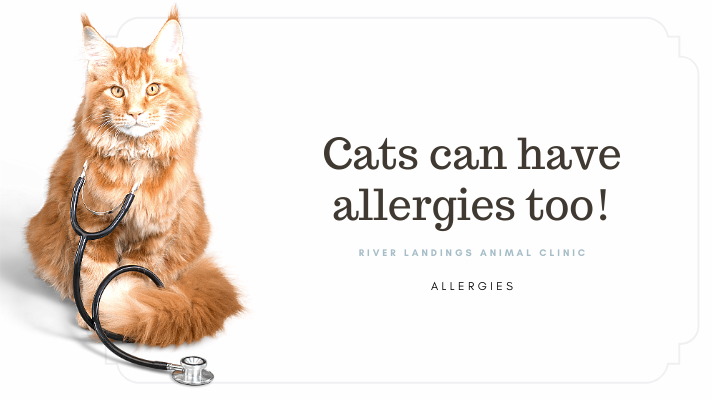When a cat has allergies, their immune system is overly sensitive to certain everyday substances and begins to identify them as dangerous. Even though this substances-or allergens-are usually common in most environments and harmless to most animals, a cat with allergies will have an extreme reaction to them. As their body tries to rid itself of these substances, they may show a variety of symptoms.
What Are Symptoms or Signs of Allergies in Cats?
Sneezing, coughing (if asthmatic), wheezing
Itchy skin/increased scratching
Itchy, runny eyes
Itchy back or base of the tail (most commonly seen in flea allergies)
Itchy ears and ear infections
Vomiting
Diarrhea
Snoring caused by an inflamed throat
Paw chewing/swollen paws
Can Cats Be Allergic to Food?
Cats who have allergies to what they eat will commonly scratch at their heads and necks, as well as have gastrointestinal problems like diarrhea and vomiting. Food allergies may show up in cats at any age. If you know your cat is specifically allergic to chicken, you should avoid feeding them any products containing chicken protein or fat. Which cats are at risk of having allergies? All cats can be at risk for developing allergies. Cats who develop allergies have usually been exposed to substances— either airborne, in food, applied to their skin, or transmitted by fleas—that they cannot tolerate. Those who spend time outdoors may be more prone to flea and pollen allergies. Overweight cats and those exposed to cigarette smoke can also develop asthma.
What Are Cats Allergic To?
The following substances can cause allergic reactions in cats who are sensitive to them:
Tree, grass, weed, mold, mildew and dust pollens
Food
Fleas and flea-control products
Prescription drugs
Perfumes
Cleaning products
Cigarette smoke
Fabrics
Rubber and plastic materials
A flea allergy may only require a few fleabites to trigger intense itchiness for 2 to 3 weeks.
What Should I Do If I Think My Cat Has Allergies?
Visit your veterinarian. After taking a complete history and conducting a physical examination, your veterinarian may determine the source of your cat’s allergic reaction. If not, your veterinarian may recommend skin or blood tests and/or a special elimination diet, to find out what's causing the allergic reaction.
How Are Cat Allergies Diagnosed?
It’s important to see a veterinarian or veterinary dermatologist for an allergy test if your cat has itchy or irritated skin. The test of choice is an intradermal skin test, as blood allergy tests are not considered as reliable.
The only way to diagnose a food allergy is to feed your cat a prescription or hydrolyzed protein diet exclusively for 12 weeks─that means no flavored medications or treats. This diet will be free of potential allergy-causing ingredients and will ideally have ingredients your cat has never been exposed to before. Your cat will remain on the diet until their symptoms go away, at which time you’ll begin to reintroduce old foods to see which ones might be causing the allergic reaction.
Please note, many cats diagnosed with a food allergy will require home-cooked meals, but this must be done in conjunction with your veterinarian as it requires a special protein and careful food balancing.
How Can Cat Allergies Be Treated?
The best way to treat allergies is to remove the offending allergens from the environment.
Prevention is the best treatment for fleas. Start a flea control program for all of your pets before the season starts. One outdoor pet can not only be exposed but can carry fleas inside to indoor pets. See your veterinarian for advice about the best flea control products for both your cat and their environment.
Use a dust-free, unscented litter. Your cat might have an allergy to the chemicals in a scented litter.
If dust is causing your cat’s allergic symptoms, clean your pet's bedding once a week and vacuum a minimum of twice weekly-this includes rugs, curtains, and any other materials that gather dust.
Bathing your cat one or two times per week regularly may help relieve itching and remove environmental allergens and pollen from their skin; talk to your veterinarian for a shampoo recommendation, as frequent bathing can also dry out the skin.
If you suspect your cat has a food allergy, they will need to be put on a prescription or hydrolyzed protein diet. Once they are diagnosed, your vet will recommend specific foods or a home-cooked diet.
Are There Allergy Medications for Cats?
Since certain substances that cause allergic symptoms cannot be removed from the environment, your vet may recommend the following medications:
In the case of airborne pollens, your vet may prescribe cortisone or steroids to help control the allergy, but the best way to manage airborne allergies is with allergy injections, which treat the allergy itself instead of just masking the itch.
Antihistamines such as Benadryl can be used, but they work best preventatively before your cat is exposed to the allergen.
Fatty acid supplements might help relieve your cat’s itchy skin. There are many shampoos that may help prevent skin infection, which occurs commonly in cats with allergies. Sprays containing oatmeal, aloe, and other natural products are also available.
There are several flea-prevention products that can be applied monthly to your cat’s skin.
Note: Do not give your cat medications unless prescribed by a veterinarian.
Are Allergies and Asthma Related?
Sensitivity to environmental pollutants, pollen, and stress can cause asthma attacks in cats. For short-term relief, your veterinarian may prescribe medications that will open up breathing passages. For long-term treatment, though, corticosteroids may be used. And please remember, no cat should be exposed to cigarette smoke—but, if your cat has asthma, cigarette smoke is an absolute no-no.
Hear From Us Again
Don't forget to subscribe to our email newsletter for more recipes, articles, and clinic updates delivered to your inbox (here). Or, you can keep up to date by liking and following our Facebook page (here).
Related: We have more information under our cat health + client care categories.

